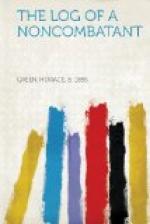In this way the city emptied itself, but so slowly that the very slowness of the movement wore the marchers out. Each family group was limited to the speed of its oldest member. Hundreds gave it up and lay by the road, or formed little gypsy camps under the trees. At night these were lighted by fires, overshadowed by the greater fire from the distant burning city, and beside them stretched dumb-looking souls, watching vaguely those who still had strength to move.
Watching these wretches got so on my nerves that I had to get out and do something. With a British intelligence officer, formerly of Sir John French’s staff, I wandered down to the southern quarter of the city known as Berchem. As usual, the guns at the outer forts had been booming throughout the evening. From the city’s ramparts you could not only feel the shudder of the earth, but you could see occasional splashes of flame from the Belgian batteries, answered, in the dim distance to the south, by smaller, less vivid splashes issuing from the mouths of the German instruments of “Culture” which throughout the night pounded ruthlessly on the unprotected houses without the city limits.
On the way home we stopped in at the British field hospital to see a wounded British friend.
Chapter VI
The Surrender Of Antwerp
As we left the British field hospital, on the Rue de Leopold, a shrieking skyrocket whizzed by above us and buried its hissing head in the river to the north. One or two more fell at a distance of several hundred yards, and in the southern part of the city flames from several houses shot up into the quiet, windless night.
The bombardment was on—the time was 12.07 Wednesday midnight.
For a moment I did not realize that this was the beginning of the end of Antwerp. I had heard so much gun-fire and seen so many bombs dropping from aeroplanes that I did not fully appreciate the significance of these shells. I scribbled a few notes in my diary, unstrapped my money belt, and then picked out an empty bed at the Queen’s Hotel and tumbled in. I must have slept for six or seven hours.
When I arose everything was quiet. The hotel was apparently deserted. I remember being particularly irritated because there was no one in the kitchen who would give me breakfast, so I made myself some tea and then strolled into the street. It so happened that the Germans had been pumping lead steadily into the city for six hours and that this was the morning lull. The Germans are methodical in everything. When they bombard a city they stop for breakfast.
As I walked down the Avenue de Keyser I thought at first it was Sunday—or rather a year of Sundays all rolled into one. Overnight the city had been transformed into a tomb. Shops were closed; iron shutters were pulled down everywhere; trolley cars stood in the street as they had been left. My own footsteps resounded fearfully on the pavement, and I walked five blocks before I saw a human being.




